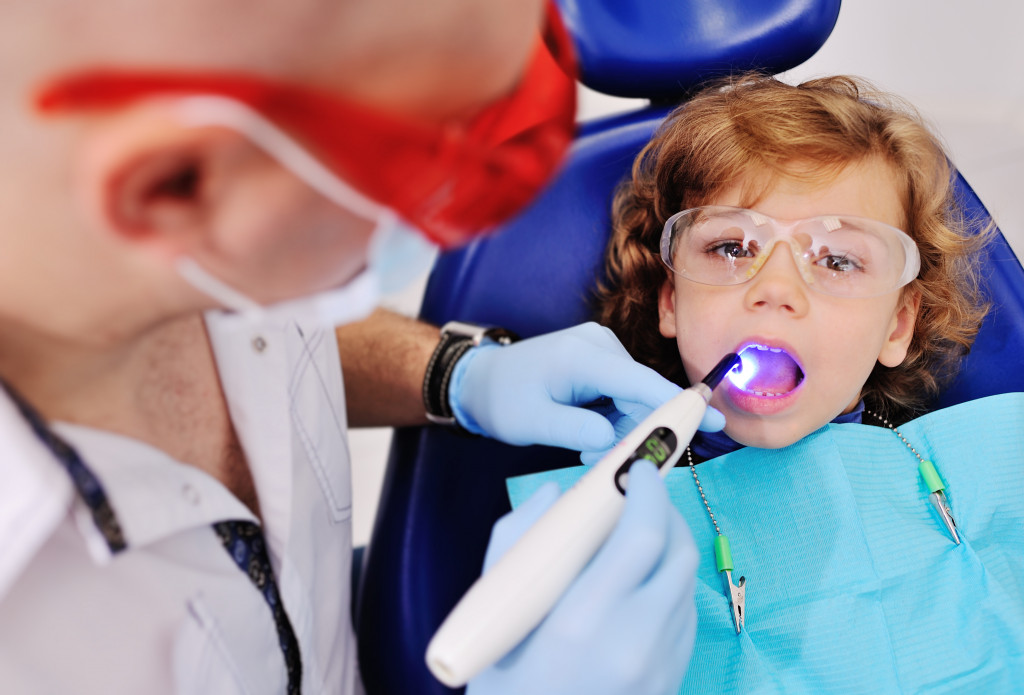- Teach your child proper oral hygiene habits early, including regular brushing and flossing, to ensure lifelong dental health.
- Monitor your child’s diet and limit sugary food and drinks to prevent tooth decay and cavities, promoting healthier choices.
- Regular dental check-ups and professional cleanings are essential for early detection of dental issues.
- Protect your child’s teeth during physical activities and address nighttime teeth grinding with appropriate dental gear like mouthguards and nightguards.
- Seek professional orthodontic treatment for misaligned or crowded teeth to maintain your child’s oral health and confidence in their smile.
As a parent, you play a crucial role in ensuring your child’s overall well-being, and one often overlooked aspect of their health is dental care. Good oral hygiene habits formed during childhood can set the foundation for a lifetime of healthy teeth and gums. Neglecting dental health can lead to problems, from cavities and gum disease to more complex orthodontic issues. This guide will provide you with five essential tips to prioritize your child’s dental health, helping them maintain a bright, confident smile for years to come.
1. Establish Consistent Oral Hygiene Habits
Proper oral hygiene starts at home, and it’s essential to instill good habits in your child from a young age. These consistent oral hygiene routines will set the stage for a lifetime of healthy teeth and gums.
Here are some tips for consistent oral hygiene habits:
Lead by Example
Leading by example is one of the most effective ways to teach your child about oral hygiene. Children often imitate their parents, so make sure you’re practicing good dental hygiene yourself. Show your child how you brush and floss your teeth, and let them see you regularly visit the dentist. This can alleviate any fears and instill the importance of these habits.
Turn Brushing and Flossing into a Game
Making oral hygiene fun can encourage your child to take part in it. You can make brushing and flossing a game by using a toothbrush that plays music for two minutes or by creating a reward system for consistent brushing and flossing. Apps that engage children with fun animations and timers can make the process more enjoyable and interactive.
Educate About the Importance of Oral Health
Educate your child about why oral hygiene is important. Explain how cavities form and the problems they can cause if left untreated. Use kid-friendly terms and visuals to help them understand. Reading books about oral health and visiting educational websites together can be beneficial.
Regular Dental Checkups
Regular dental checkups are a key part of oral hygiene. Aim for checkups every six months or as your pediatric dentist recommends. These visits can help identify potential issues early on, ensuring your child’s teeth remain healthy and strong. Regular dental checkups can also teach your child that dental care is a normal part of health maintenance.
2. Monitor Diet and Limit Sugary Treats

Your child’s diet has a significant impact on their dental health. Sugary snacks and drinks can contribute to tooth decay and cavities. Limit the consumption of sugary foods and beverages, such as soda, candy, and cereals. Encourage healthier options like fresh fruits, vegetables, and dairy products.
When your child indulges in sweets, ensure they brush their teeth or rinse their mouth with water afterward. It’s also essential to be mindful of hidden sugars in foods. Read labels carefully, and be aware that even seemingly healthy snacks like dried fruits and fruit juices can contain high sugar levels. By monitoring their diet and teaching them to make smart food choices, you can help protect their dental health.
3. Regular Dental Check-ups
Regular dental check-ups are a cornerstone of maintaining your child’s dental health. Schedule their first dental appointment when their first tooth erupts, usually around their first birthday. These early visits help the dentist monitor the development of their teeth and guide proper oral care.
As your child grows, continue with regular dental check-ups at least twice a year. These visits are essential for early detection of dental issues and professional cleanings, which can remove plaque and tartar buildup that regular brushing and flossing may miss. A pediatric dentist specializes in treating children and can create a positive and comfortable dental experience for your child, helping to dispel any fears or anxieties they may have about dental visits.
4. Protect Teeth During Physical Activities

Active children often engage in sports or physical activities, and protecting their teeth is crucial during these endeavors. Dental injuries can be painful and result in long-term damage. Encourage your child to wear a mouthguard during contact sports like football, basketball, or hockey. Custom-fitted mouthguards offer the best protection and comfort.
If your child grinds their teeth at night (a condition known as bruxism), consult with their dentist about using a nightguard. This can prevent tooth wear and discomfort associated with teeth grinding. By taking these precautions, you can safeguard your child’s teeth while they enjoy their favorite activities.
5. Invest in Professional Orthodontics for Any Issues
Despite your best efforts, your child may still encounter dental issues that require professional intervention. Orthodontic problems like misaligned teeth, overbites, underbites, or crowded teeth can impact their oral health and self-esteem. Investing in professional orthodontics is a proactive step to address these issues.
For instance, Invisalign aligners or braces can help correct misaligned teeth, improving their bite and preventing cavities. Orthodontic treatment can also improve their facial aesthetics, boosting their self-confidence in their smile.
In Summary
Prioritizing your child’s dental health is an investment in their overall well-being. By establishing consistent oral hygiene habits, monitoring their diet, scheduling regular dental check-ups, protecting their teeth during physical activities, and addressing any orthodontic issues promptly, you can set them on a path to a lifetime of healthy teeth and a confident smile. Remember, your guidance and proactive efforts as a parent can make all the difference in their dental health, ensuring they grow up with strong, beautiful teeth and the knowledge to maintain them throughout their lives.




